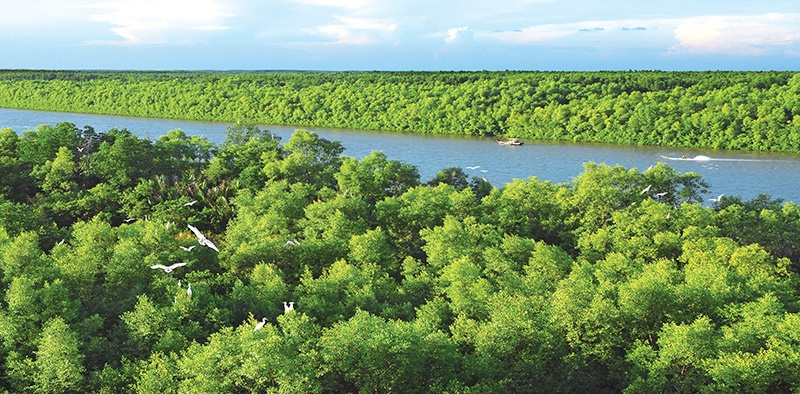A year of environmental progress
 |
| Last year, more nature and biosphere reserves gained recognition from UNESCO, Photo: Shutterstock |
Natural resources management
This is one of the key tasks identified in the Resolution of the 13th National Party Congress and is an important topic at the high-level agenda of the Party and state leaders.
Natural resources management and environmental protection are key topics that the Party and state leaders directly discuss at domestic and international high-level conferences and forums. The set tasks need to be strictly managed to rationally and effectively use land and resources; protect and improve the environment; and proactively and actively implement solutions to adapt to climate change and natural disasters.
Strong commitment at COP26
The prime minister led the Vietnamese delegation to attend the COP26 climate summit with a strong commitment to act in response to climate change and energy transition, opening up many opportunities to access knowledge, technology, and finance.
Vietnam has committed to net zero emissions by 2050 and to achieve methane emission reduction by 30 per cent by 2030. It also joined the declarations on the transition away from coal in 2030-2040 and Lowering Emissions by Accelerating Forest coalition.
Land use planning
The National Assembly passed a resolution on national land use planning for 2021-2030 with a vision to 2050, along with a more detailed plan for 2021-2025.
The resolution identifies the target to ensure enough land for the country’s socioeconomic development strategy, thus laying a foundation to turn Vietnam into a high-income developed nation by 2045, ensuring national defence and security, protecting the environment and ecosystems, and adapting to climate change.
New directive on hydrometeorology
The development strategy of the hydrometeorological sector to 2030, with a vision to 2045, was approved by the prime minister in November.
Vietnam’s hydrometeorology aims to reach the advanced science and technology level of Asia, capable of providing sufficient, reliable, and timely hydro-meteorological information and data to meet the requirements of socioeconomic development, natural disaster prevention and control as well as climate change adaptation.
Water management incorporated in master plans
The prime minister approved the general planning of river basins, a master plan on basic survey of water resources to 2030, and a number of other projects. These continue to be tools to improve the efficiency of management and use of national water resources to ensure national water resource security and inter-regionality; efficient use of water resources in river basins; and consistency with national and regional planning for socioeconomic development.
Promoting marine economy innovation
The prime minister issued Directive No.31/CT-TTg dated November on the strategy for sustainable development of Vietnam’s marine economy to 2030, with a vision to 2045.
Also in 2021, the National State of Sea and Island Environment Report for 2016-2020 was published. This is the first report to reflect the existing state of the national marine environment, serving as a foundation for orientation and proposing solutions to effectively manage, prevent, and reduce pollution, as well as gradually improve the sea and island environment.
Operation of remote satellite systems
The exploitation of remote sensing satellite signal reception was carried out, to receive high-resolution image data from French satellites, providing a number of images covering the entire territory on land and in the seas of Vietnam.
Along with this acquisition, the high-resolution remote sensing satellite signal system contributes to building a large database of remote sensing, serving the management requirements and providing data for industries and fields serving socioeconomic development, defence, and security assurance.
Biosphere reserves recognised by UNESCO
Nui Chua Biosphere Reserve has a typical arid ecosystem in Southeast Asia with a natural area of nearly 30,000 hectares, and where more than 1,500 species of plants live together. The forest ecosystem has special value and is one of 200 globally important ecological regions selected for the highest conservation priority of all major habitat types on Earth.
Kon Ha Nung Biosphere Reserve, meanwhile, has a unique plateau feature spreading over 413,000ha, including the entire area of Kon Ka Kinh National Park and Kon Chu Rang Nature Reserve in the Central Highlands province of Gia Lai. It contains a treasure trove of the rich and distinctive cultural heritage of the local community.
Can Tho’s sustainability accolades
Can Tho city won the ASEAN Environmentally Sustainable City Award last year, the fifth Vietnamese city to pick up the award.
Meanwhile, Thai Van Nguyen – who founded Save Vietnam’s Wildlife, which rescued 1,540 pangolins from the illegal wildlife trade since 2014 – won the Goldman Prize Recipient Asia, one of the world’s most prestigious honours for those working on environmental issues.
Dr. Nguyen Hoang Minh from the National Centre for Hydrometeorological Forecasting became the first Vietnamese weather forecaster to receive an award from the World Meteorological Organisation for his research on improving the capability of a coupled meteorological and hydrological model for rainfall and flooding forecasts.
What the stars mean:
★ Poor ★ ★ Promising ★★★ Good ★★★★ Very good ★★★★★ Exceptional
Related Contents
Latest News
More News
- Hermes joins Long Thanh cargo terminal development (February 04, 2026 | 15:59)
- SCG enhances production and distribution in Vietnam (February 04, 2026 | 08:00)
- UNIVACCO strengthens Asia expansion with Vietnam facility (February 03, 2026 | 08:00)
- Cai Mep Ha Port project wins approval with $1.95bn investment (February 02, 2026 | 16:17)
- Repositioning Vietnam in Asia’s manufacturing race (February 02, 2026 | 16:00)
- Manufacturing growth remains solid in early 2026 (February 02, 2026 | 15:28)
- Navigating venture capital trends across the continent (February 02, 2026 | 14:00)
- Motivations to achieve high growth (February 02, 2026 | 11:00)
- Capacity and regulations among British areas of expertise in IFCs (February 02, 2026 | 09:09)
- Transition underway in German investment across Vietnam (February 02, 2026 | 08:00)

 Tag:
Tag:



















 Mobile Version
Mobile Version